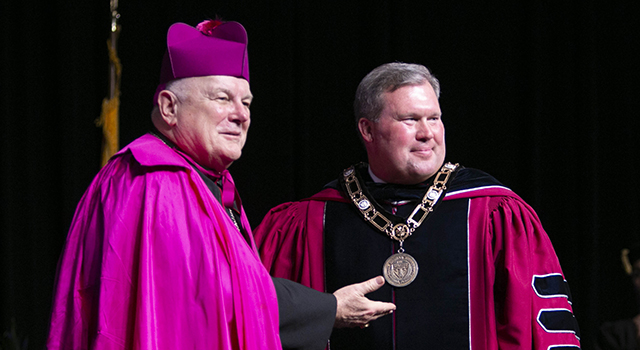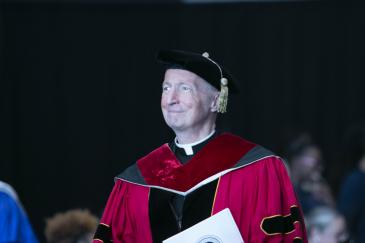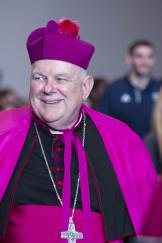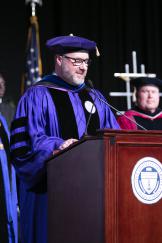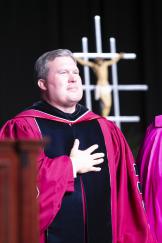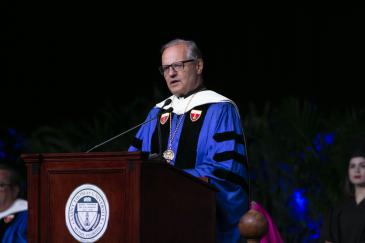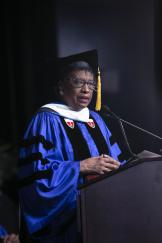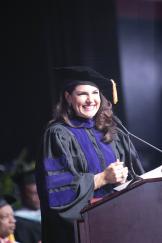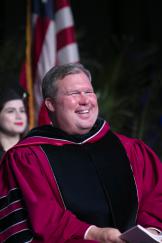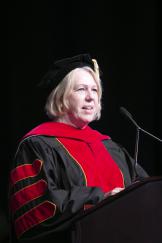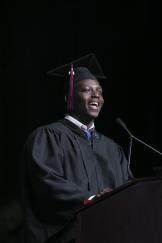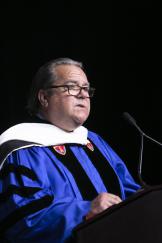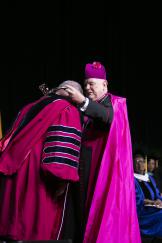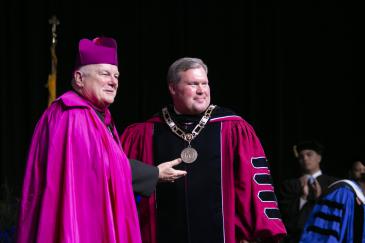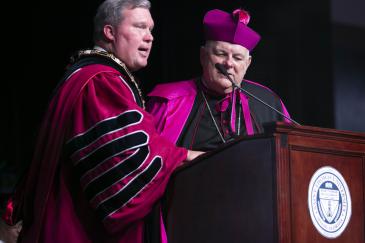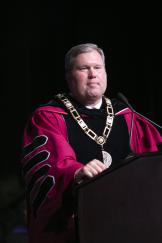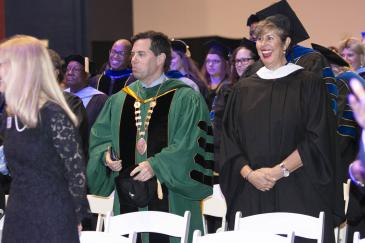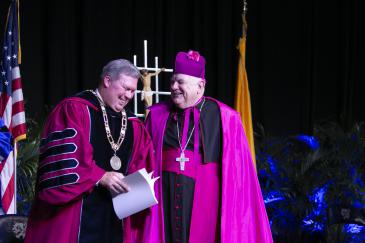By Ana Rodriguez Soto - Florida Catholic newspaper
Photography: ANA RODRIGUEZ-SOTO | FC
MIAMI GARDENS | St. Thomas University President David Armstrong has wasted no time in his less than a year on the job.
After announcing almost immediately upon arrival last August that the university would field a football team, he already has a head coach and 140 players signed up. A marching band is on the way. Construction has begun on the Gus Machado School of Business. The school has a new provost, Jeremy Moreland, and a new law school dean, Tamara Lawson, the first woman of color to hold the position. The university’s Law Trial Team also notched their second straight win in the National ABA Labor Law Trial Competition, beating counterparts from Harvard and other elite schools in the process.
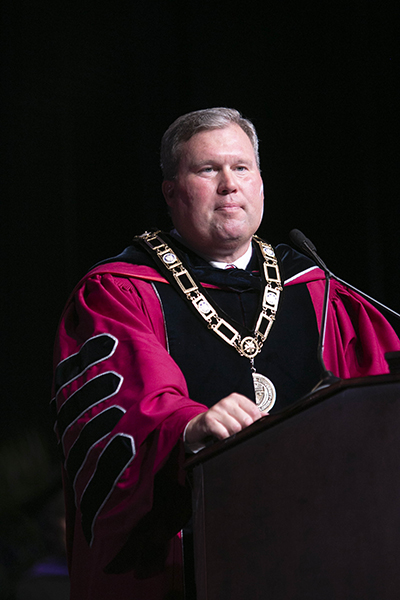
Photographer: ANA RODRIGUEZ-SOTO | FC
David A. Armstrong addresses guests, students and staff gathered for his inauguration as 10th president of St. Thomas University, Miami Gardens, March 20, 2019.
At his formal inauguration March 20, Armstrong promised more of the same. The launching of an ethical leadership program to match the university’s focus on “forming leaders for life” with a strong Catholic ethos. A strengthening of the liberal arts curriculum. Making experiential learning a graduation requirement so every student will graduate with “outside, real-world work” experience. And partnering with local businesses and industries to better align the university’s curriculum to their needs.
“We will strive to be the great Catholic university for this great American city,” Armstrong told students, faculty and civic leaders gathered at the Fernandez Family Center for the two-hour inauguration ceremony. “We will think and we will dream big and we will be bold.”
But he also warned, “We must steward our resources. We cannot live on deficits. And, “we have very tough decisions ahead,” although he gave no specifics.
Both Armstrong and a previous speaker, Matthew Whelan, vice president for strategic initiatives at Stony Brook University in New York, noted the crisis facing small, private, faith-based, liberal arts colleges such as St. Thomas.
Whelan, who has known Armstrong since their days as students at Mercyhurst College (now University) in Erie, Pennsylvania, said such colleges are being “challenged to prove their worth and to do so well, or face the end.” But, he added, Armstrong’s “mission is to propel St. Thomas forward.”
“He is taking St. Thomas University to the streets. He is not waiting to be found,” said Mary Carter Waren, professor of theology and head of St. Thomas University’s Faculty Forum. “President Armstrong is taking the private out of private education at St. Thomas University.”
She was one of about half a dozen dignitaries who spoke at the inauguration ceremony, including Miami-Dade County Commissioner Barbara Jordan, Miami Gardens Mayor Oliver G. Gilbert III, both of whom have formed civic partnerships with the university, and the presidents of St. Thomas’ Student Government Association and Student Bar Association.
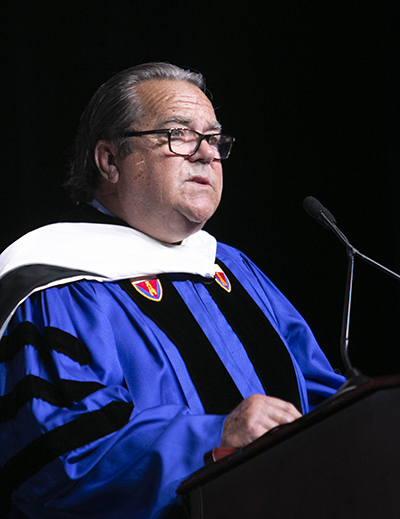
Photographer: ANA RODRIGUEZ-SOTO | FC
John J. Dooner, a 1970 alumnus who now chairs the Board of Trustees of St. Thomas University, speaks at the inauguration of David A. Armstrong as the school's 10th president, March 20, 2019.
“St. Thomas has come quite a long way in the last decade and I expect no less from you, President Armstrong,” said Judge Tarlika Navarro, a 2010 graduate and one of 29 active judges who are STU law alumni. She noted that St. Thomas is ranked number one nationwide in Hispanic law school graduates, number 9 in female law school enrollment, and among the top 10 for most diverse faculty.
Armstrong also spoke about the university’s diversity. “We are Miami. We are South Florida,” he said, pointing proudly to St. Thomas’ student body, 81 percent of whom are minorities, mostly Hispanic; 31 percent of whom are first generation college students; and 51 percent of whom are Pell Grant eligible.
Alluding to the university’s history, he noted its establishment in Havana, Cuba, in 1946 by Augustinian Friars from the U.S. When the Castro regime took power and expelled the Augustinians in 1961, Santo Tomás de Villanueva re-established itself in Miami as Biscayne College. In 1984, it opened a law school and changed its name to St. Thomas University. And in 1988 it came under the sponsorship of the Archdiocese of Miami – one of only eight archdiocesan-sponsored university in the United States.
“This story is so much like that of the wonderful Cuban Americans I’ve met in my time here,” said Armstrong, one of seven siblings born to a devout Catholic family in Cleveland, Ohio. “They are the epitome of the American dream.”
After graduating from Mercyhurst and obtaining a law degree, Armstrong served for over a decade in leadership roles at Notre Dame College in Euclid, Ohio. Most recently, he served as president of St. Thomas More College in Crestview Hills, Kentucky.
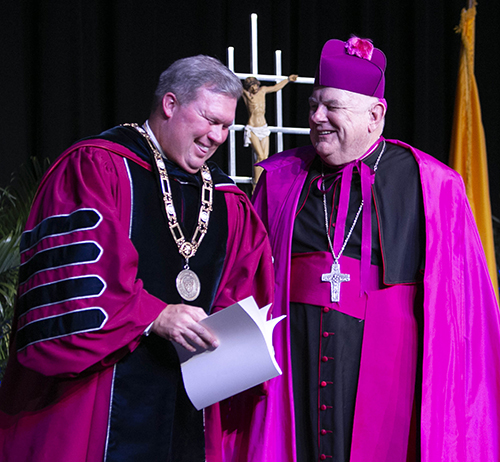
Photographer: ANA RODRIGUEZ-SOTO | FC
Archbishop Thomas Wenski and David A. Armstrong share a laugh at the conclusion of Armstrong's inauguration as 10th president of St. Thomas University, Miami Gardens, March 20, 2019.
He stressed that the founding fathers of the U.S. believed the key to success for their “self-governing republic” was a populace characterized by virtue and knowledge – in other words, morality and education. Society today, he said, seems to value neither religion, which teaches morality, nor education, judging by cutbacks in government funding.
St. Thomas is “doing God’s work,” Armstrong said, by making a values-based education available to many, especially first-generation college students. He pointed out that even state universities in many cases have become “elite” schools – hard to get into.
But he took a swipe at the idea, being floated in some political circles, of free college for everyone. “Anything that is of value is not free,” he said. “Socialism is not the answer.”
John J. Dooner, chair of St. Thomas’ board of trustees and a 1970 graduate of the original, Biscayne College, praised Armstrong as someone with a reputation for increasing enrollment and growing the resources of small, faith-based, liberal arts schools.
“There is not a job on campus that President Armstrong hasn’t done,” Dooner said. He is “totally committed to the success of our students.”
Armstrong ended his talk with this promise to the university’s faculty and students: “Know that every second that I am here, I will always be your servant.”
